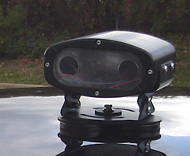2/3/2014
California: Lawsuit Filed Over License Plate Reader SecrecyElectronic Freedom Foundation and ACLU team up to battle Los Angeles, California over license plate reader use.

Police in Los Angeles, California do not want the public to know how the department uses automated license plate readers (ALPR or ANPR in Europe). On Friday, privacy advocates filed a lawsuit to force the city government to reveal how this technology is being used to track motorists.
The Electronic Freedom Foundation and the American Civil Liberties Union (ACLU) of Southern California filed suit in Los Angeles County court to force the production of all information that the systems gathered over the course of one week in August 2012. The privacy groups believe this will reveal the true extent of license plate reader use in the city.
"We have also argued... that the only way to have an informed public debate about appropriate limits on ALPRs is through greater transparency about how the technology is actually being used," EFF's Jennifer Lynch and ACLU's Peter Bibring wrote in announcing the suit. "It isn't possible to know what police are really doing until we have at least a representative slice of the data they collect."
The Los Angeles Police Department and the Los Angeles Sheriff's Department refuse to disclose the information the program has gathered on the public. The privacy groups insist state law requires disclosure.
"ALPR data are not subject to an evidentiary privilege as 'official information,' as they were collected without consent, not shared in confidence," the groups wrote in their brief to the court. "As data collected en masse on the lawful activities of the general public, ALPR data are neither investigatory records into specific crimes nor intelligence information. Because no exemptions apply, this court should order respondents to produce the requested ALPR data."
The ACLU has so far examined 26,000 pages of documents obtained from similar requests filed with law enforcement agencies around the country. The group found that 0.005 percent of the motorists scanned by the devices have ever been linked to a serious crime. ACLU and EFF believe they have caught police officials in a trap, since they cannot argue "privacy" to withhold the data without admitting they violated privacy rights to collect it in the first place.
"In invoking the catch-all exception, respondents have only asserted the 'confidentiality' of the records; they notably fail to assert the privacy interests of the vehicles' drivers whose information has been captured," the groups argued. "As set forth above, petitioners recognize that license plate data yields location information that can reveal intimate facts about political or religious associations or other personal matters and thus raises significant privacy interests."
The groups hope that further disclosure about the actual use of license plate scanning technology will encourage a robust policy debate.
"While ALPR technology can be a powerful tool, without proper safeguards, the technology can also harm individual privacy and civil liberties," the groups argued. "A network of readers enables police to collect extensive location data on an individual, without his knowledge and without any level of suspicion. ALPRs can be used to scan and record vehicles at a lawful protest or house of worship; track all movement in and out of an area; specifically target certain neighborhoods or organizations; or place political activists on hot lists so that their movements trigger alerts."


